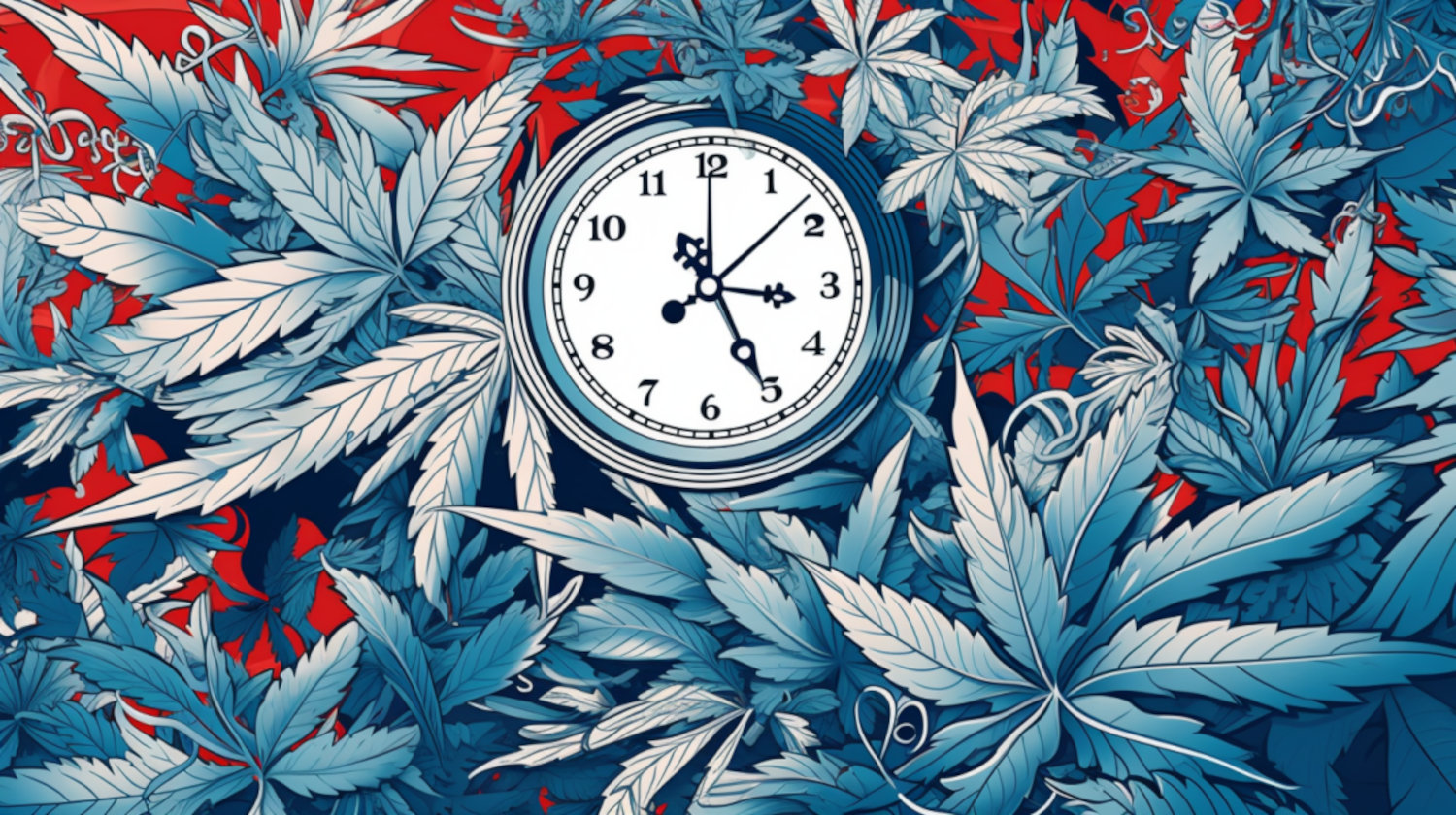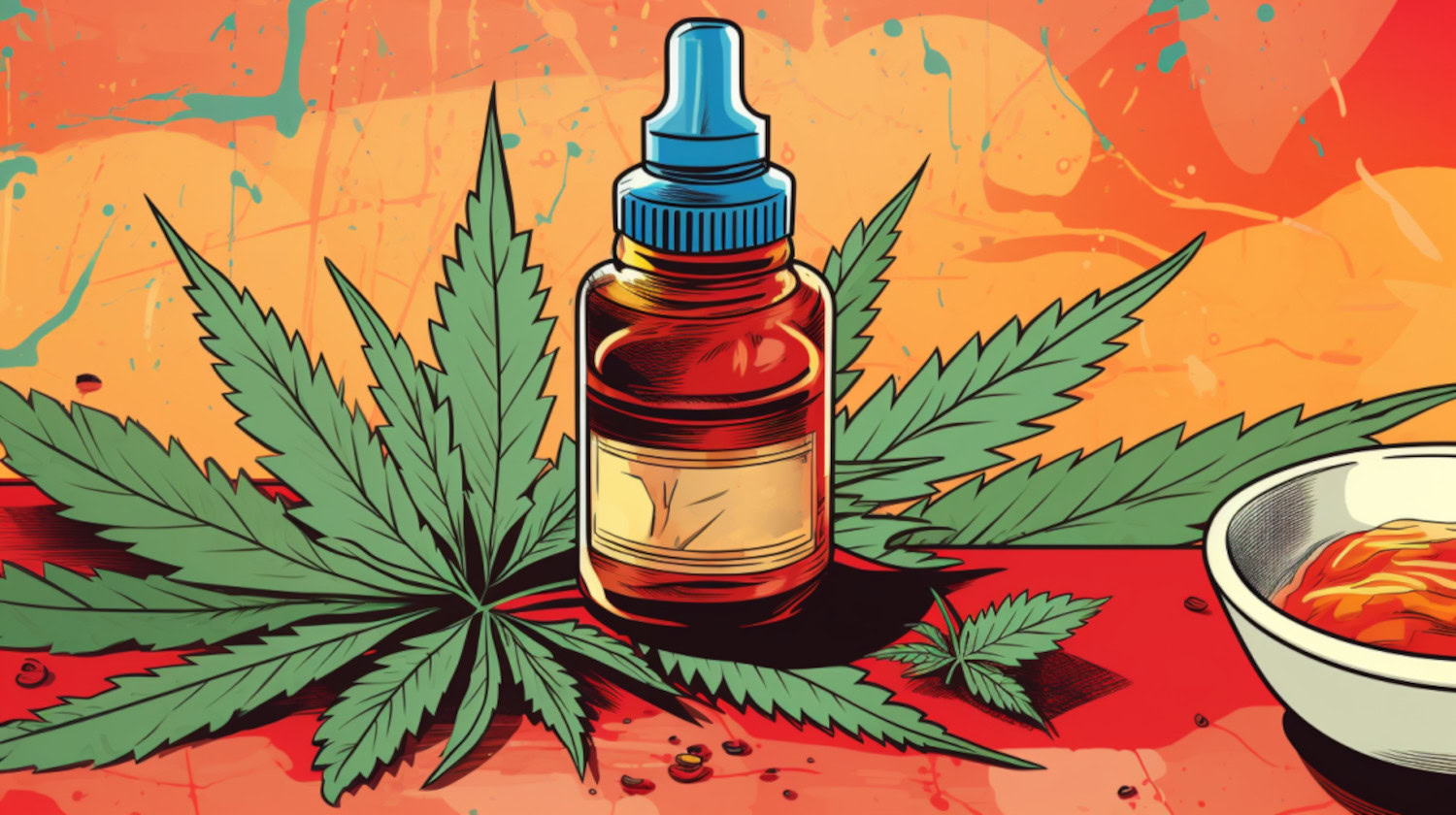In This Article
- How Long Does CBD Stay In Your System?
- What Is CBD Half-Life?
- The Factors That Affect How Long CBD Stays In Your System
- How Long Does CBD Last Based on Product Type?
- Why Detox From CBD?
- Tips for Detoxing CBD Efficiently and Quickly
- Can you get high on CBD?
- Can you overdose on CBD?
- Is CBD detectable by drug tests?
- What's the difference between full-spectrum and broad-spectrum CBD?
- Does CBD interact with medications?
- What's the difference between CBD and THC?
- Managing CBD Use
- References
Key Takeaways
- CBD can stay in your system for 2 to 5 days, but this varies based on several factors.
- Detection times differ by test type: urine (3–7 days), blood (1–2 days), saliva (1–3 days), and hair (up to 90 days).
- Factors like dosage, frequency, and metabolism influence how long CBD remains in the body.
How long CBD stays in your system can depend on how much you take, how often you use it, and your body’s metabolism. While CBD doesn’t produce a high, trace amounts might still appear on drug tests, which makes it important to know how long it lings in the body.
Learning how long CBD oil lasts in the body (and how to flush it out when needed) can allow more consumers to enjoy the benefits without experiencing unwanted or lingering side effects.
How Long Does CBD Stay In Your System?
CBD's presence in the body depends on usage habits and individual factors. Generally, CBD can be detected in:
- Urine: 3 to 7 days.
- Blood: 1 to 2 days.
- Saliva: 1 to 3 days.
- Hair: Up to 90 days.
However, these estimates can vary based on personal metabolism and product type.
It's also important to note that how long the effects of CBD last isn't the same as how long CBD may be detectable in your system. The effects of CBD may be as short-lived as 2 hours or as long as 8 hours, depending on various factors.1 In contrast, CBD traces can be detectable for days or weeks since your last dose. Chronic users with high tolerance levels will likely take significantly longer to flush CBD from their bodies than first-timers.
So how long does CBD last in the body?
The length of time CBD can last in the body varies from 26 hours to 5 days.2 Traces of CBD may still be present in heavy, regular users from 10-14 days (or may be detectable for even longer with certain drug tests).
What Is CBD Half-Life?
Many of the available studies that investigated the time it takes for CBD to clear the body looked at the "half-life" of CBD. This term refers to the time it takes for half of the total amount of a substance to be removed from the body.
A 2005 study published in the journal Therapeutic Drug Monitoring found that the half-life of oral CBD in single doses rests between 1 and 2 days.3
A 2020 study featured in the Journal of Analytical Toxicology determined that CBD can be found in urine 4-5 days post-ingestion.4 All participants consumed a single dose of a standardized CBD formulation.
Interestingly, it appears that the body processes and eliminates CBD much faster than THC. The elimination half-life of CBD in the bloodstream is 14-17 hours among healthy individuals who ingest purified CBD formulations. CBD is only measurable in plasma for a maximum of 5 hours, while THC metabolites are detectable for up to a week.
A separate study published in Science Direct found that hair samples from individuals who used CBD-rich cannabis contained THC metabolites with unusual profiles, proving the importance of CBD detoxing if you have a job that requires mandatory drug testing.5
The Factors That Affect How Long CBD Stays In Your System

Considering the vastness of the demographic who uses CBD—60% of people in the U.S. use or have tried at least one type of CBD product—there's no definitive answer to the question, "How long does CBD stay in your system?"
Every human on planet Earth has a unique biochemistry. Factors such as a person's biological composition, genetics, age, weight, dosage, CBD product choice, and lifestyle behaviors/habits will also impact how long the cannabinoid remains in the body. On top of this, the active ingredients will affect how to get rid of CBD oil in your system.
Research indicates that upwards of 65% of cannabis is discharged from the body in fecal matter and 20% is released in the urine.6 The remainder of cannabis' chemical remnants (cannabinoid metabolites) are stored in the body for anywhere from 1 hour to 50 days, although THC has been detected in the hair for up to 90 days.
Some factors that affect CBD's longevity in the body include:
- CBD Dosage - The simple rule of thumb is as follows: the higher the CBD dosage, the longer it will take to get rid of CBD oil in your system.
- Body Type and Metabolism - The faster a person's metabolism is, the faster CBD will leave their system, and vice-versa. Research indicates that CBD inhibits CYP3A4 and CYP2D6–two enzymes used to metabolize various compounds and medications–and may increase drug concentration via decreased metabolism.
- Diet - Food intake influences how the body processes CBD, with a 2019 study discovering that CBD exposure and absorption improves following high-fat food consumption.7 The cannabinoid's half-life increases with food intake and more CBD is detectable in the bloodstream following a high-fat meal. Fasting produces the opposite result.8
- Product Type - Just as the onset time varies based on product type, so does the elimination timeline. For example, edible cannabis products may linger in the body for longer than vaporized CBD.
- Frequency of Use - CBD will accumulate inside the body when used consistently. Consequently, this affects how long CBD lasts in the system. Clearance will likely be slower in older adults who consume CBD regularly, as metabolism slows with age.9
- Medication - CBD may produce adverse effects in consumers who use warfarin (blood thinner), amiodarone (heart rhythm drug), levothyroxine (thyroid medication), and numerous seizure medications, like clobazam, lamotrigine, and valproate. Because the liver metabolizes CBD, patients who take liver-metabolized medications may metabolize CBD differently from others.
Although the above factors reportedly influence the duration of CBD's presence in the body, further research is needed to determine how long CBD stays in the body at various doses and under specific circumstances.
How Long Does CBD Last Based on Product Type?
Not only will the chosen route of administration determine the time it takes to feel the effects of CBD, but also how long CBD stays in the body. Dosage plays the most prominent role in how quickly the body expels (and uses) cannabinoids like CBD.
Levels of CBD drop significantly after one hour of administration via inhalation and within 3-4 hours after administration via oral absorption.10 The detection of CBD by tests in blood or urine may be dose dependent. This is even more true for oral intake–like tinctures and sprays–of CBD due to the metabolism and absorption of the cannabinoid.
Studies have demonstrated that there is minimal evidence to support the idea that chronic use of CBD causes the body to store its metabolites longer, but more research is needed.
Products using nanoemulsion technology, like CBD water, have a greater absorption rate and may be present in the system longer.11 Research also demonstrates that eating food may also increase the concentration of CBD in blood plasma, compared to an empty stomach.
In general, CBD can remain in the body anywhere from two to five days after use. Consistent use of CBD will result in metabolites remaining in the body for as long as a person continues to use CBD products.
Obtaining/requesting proof of laboratory testing results is recommended to pinpoint CBD product purity, potency, and the presence of other ingredients. All of these factors may influence the overall experience and longevity.
Lab testing certificates will also highlight the presence of other cannabinoids. They'll also highlight additional additives—artificial flavorings, preservatives, or sweeteners—and potentially harmful substances like heavy metals, microbes, and pesticides.
Why Detox From CBD?

Plenty of people wonder how to detox from cannabis or, in this case, CBD.
Despite the myriad benefits, there may come a time when stopping CBD use is necessary. Most cannabis compounds (80% to 90%) are expelled by the body within 5 days as carboxylated and hydroxylated metabolites. In some cases, the elimination process may take longer. 12
Fortunately, a quality detox can quickly flush CBD from the body.. Here are some reasons to get rid of CBD in the body:
- Giving Your Tolerance Level a Reboot - Cleansing the body of CBD will reset your cannabinoid receptors and increase sensitivity the next time you use it.
- Preparing for Anesthesia Induction - Going under anesthesia for a surgical procedure while under the influence of cannabis may amplify the risk of complications by raising heart rate and lowering blood pressure, thus proving the importance of abstaining from these plant-based medicines before surgery.
- Using New Medication - Cannabinoids like CBD may produce synergistic reactions when consumed with other medications, such as gabapentin.
- Passing a Drug Test - The U.S. Food and Drug Administration (FDA) does not regulate many CBD products. As a result, products often contain traces of THC that could trigger a positive drug test. Detoxing will ensure you pass the test.
Tips for Detoxing CBD Efficiently and Quickly
A surge of cannabis detox products has emerged hot on the heels of the ever-evolving legal cannabis market. From metabolism-boosting pills and cleansing drinks to shampoos and dietary fiber supplements, the cannabis detox market is brimming with products designed to banish CBD from the body. Just make sure you aren't using a CBD shampoo.
Since many CBD (and THC) detox kits are widely unregulated and may contain synthetic ingredients, uneducated buyers often consume potentially harmful substances. Mitigate risk and learn how to get rid of CBD in the body by using ingredients sourced from Mother Nature and natural techniques instead.
Here are a few methods worth considering:
- Time - As the old saying goes, "Time is a great healer." By abstaining from CBD use for 2-3 weeks, you can safely and effectively eliminate the cannabis compound from your body.
- Hydration and Exercise - Physical activity bolsters circulation, encouraging the body to process and expel CBD faster. Exercise will also kickstart the body's natural detoxification processes and increase metabolic rate.13
- Fiber - The majority of CBD is excreted in feces. Introducing more fiber into your diet may speed up digestion to enable you to get rid of CBD from your system more quickly.14
A little bit of research can save you the time and hassle of visiting a doctor's office to ask common questions. Rather than scouring the web for answers, enlighten yourself by reading our CBD and body FAQs:
Can you get high on CBD?
Since CBD crosses the blood-brain barrier, it possesses the power to influence mood.15 However, CBD is non-intoxicating and will not cause feelings of euphoria, intoxication, or dizziness like THC might.
Can you overdose on CBD?
"Start low, go slow" is the best motto regarding CBD dosage, with 25mg being a good starting point. Nevertheless, daily doses of 1,500 mg are reportedly well tolerated in humans.16
Is CBD detectable by drug tests?
Hemp products containing low quantities of Δ9-THC may appear on a urine drug test. While CBD isolate products may claim to have zero-THC, with the lack of standardization among analytical labs, it is not recommended to rely on using CBD isolate products to pass a drug test.17
What's the difference between full-spectrum and broad-spectrum CBD?
Full-spectrum CBD is packed with many of the cannabis plant's cannabinoids and compounds, including up to 0.3% THC, whereas broad-spectrum CBD does not contain THC. Both full-spectrum CBD and broad-spectrum may produce synergistic reactions with other cannabinoids and terpenes, but broad-spectrum CBD lacks any potential benefits from THC.
Does CBD interact with medications?
Several studies show that CBD may interact with antidepressants, anti-epileptic drugs, THC, and opioid analgesics and produce divergent effects.18 CBD also interacts with numerous other over-the-counter medications, like antihistamines.
What's the difference between CBD and THC?
THC binds with CB1 receptors that affect vital physiological processes like pain, inflammation, memory, and hunger, CBD indirectly stimulates CB1 and CB2 receptors, which play a protective role in neuroinflammatory conditions.19
Managing CBD Use
Understanding how CBD interacts with your body helps in making informed decisions about its use.
If you're concerned about CBD showing up on a drug test, consider the following:
- Choose products labeled as THC-free or broad-spectrum to minimize THC exposure.
- Be aware of your usage patterns; frequent use can lead to longer detection times.
- Consult a healthcare professional if you have concerns about CBD and drug testing.
References
- Perkins D, Butler J, Ong K, et al. A Phase 1, Randomised, Placebo-Controlled, Dose Escalation Study to Investigate the Safety, Tolerability and Pharmacokinetics of Cannabidiol in Fed Healthy Volunteers. European Journal of Drug Metabolism and Pharmacokinetics. 2020;45(5):575-586. doi:https://doi.org/10.1007/s13318-020-00624-6
↩︎ - Lucas CJ, Galettis P, Schneider J. The pharmacokinetics and the pharmacodynamics of cannabinoids. British Journal of Clinical Pharmacology. 2018;84(11):2477-2482. doi:https://doi.org/10.1111/bcp.13710
↩︎ - Welty TE, Luebke A, Gidal BE. Cannabidiol: Promise and Pitfalls. Epilepsy Currents. 2014;14(5):250-252. doi:https://doi.org/10.5698/1535-7597-14.5.250
↩︎ - Spindle TR, Cone EJ, Kuntz D, et al. Urinary Pharmacokinetic Profile of Cannabinoids Following Administration of Vaporized and Oral Cannabidiol and Vaporized CBD-Dominant Cannabis. Journal of Analytical Toxicology. 2019;44(2):109-125. doi:https://doi.org/10.1093/jat/bkz080
↩︎ - Casati S, Angeli I, Bergamaschi RF, et al. Determination of cannabinoids in hair: Indicators for illegal vs CBD-rich cannabis use. Forensic Science International. 2022;333:111237. doi:https://doi.org/10.1016/j.forsciint.2022.111237
↩︎ - Sharma P, Murthy P, Bharath MMS. Chemistry, metabolism, and toxicology of cannabis: clinical implications. Iranian journal of psychiatry. 2012;7(4):149-156. Accessed July 26, 2023. https://www.ncbi.nlm.nih.gov/pmc/articles/PMC3570572/#CIT0058
↩︎ - Birnbaum AK, Karanam A, Marino SE, et al. Food effect on pharmacokinetics of cannabidiol oral capsules in adult patients with refractory epilepsy. Epilepsia. 2019;60(8):1586-1592. doi:https://doi.org/10.1111/epi.16093
↩︎ - Crockett J, Critchley D, Tayo B, Berwaerts J, Morrison G. A phase 1, randomized, pharmacokinetic trial of the effect of different meal compositions, whole milk, and alcohol on cannabidiol exposure and safety in healthy subjects. Epilepsia. 2020;61(2):267-277. doi:https://doi.org/10.1111/epi.16419
↩︎ - Abdulkader RCRM, Burdmann EA, Lebrão ML, Duarte YAO, Zanetta DMT. Aging and decreased glomerular filtration rate: An elderly population-based study. Ashton N, ed. PLOS ONE. 2017;12(12):e0189935. doi:https://doi.org/10.1371/journal.pone.0189935
↩︎ - Millar SA, Stone NL, Yates AS, O’Sullivan SE. A Systematic Review on the Pharmacokinetics of Cannabidiol in Humans. Frontiers in Pharmacology. 2018;9. doi:https://doi.org/10.3389/fphar.2018.01365
↩︎ - Millar SA, Maguire RF, Yates AS, O’Sullivan SE. Towards Better Delivery of Cannabidiol (CBD). Pharmaceuticals. 2020;13(9):219. doi:https://doi.org/10.3390/ph13090219
↩︎ - Chayasirisobhon S. Mechanisms of Action and Pharmacokinetics of Cannabis. The Permanente Journal. 2020;24(5). doi:https://doi.org/10.7812/tpp/19.200
↩︎ - KNAB AM, SHANELY RA, CORBIN KD, JIN F, SHA W, NIEMAN DC. A 45-Minute Vigorous Exercise Bout Increases Metabolic Rate for 14 Hours. Medicine & Science in Sports & Exercise. 2011;43(9):1643-1648. doi:https://doi.org/10.1249/mss.0b013e3182118891
↩︎ - Huestis Marilyn A. Human Cannabinoid Pharmacokinetics. Chemistry & Biodiversity. 2007;4(8):1770-1804. doi:https://doi.org/10.1002/cbdv.200790152
↩︎ - Calapai F, Cardia L, Sorbara EE, et al. Cannabinoids, Blood–Brain Barrier, and Brain Disposition. Pharmaceutics. 2020;12(3):265. doi:https://doi.org/10.3390/pharmaceutics12030265
↩︎ - Iffland K, Grotenhermen F. An Update on Safety and Side Effects of Cannabidiol: A Review of Clinical Data and Relevant Animal Studies. Cannabis and Cannabinoid Research. 2017;2(1):139-154. doi:https://doi.org/10.1089/can.2016.0034
↩︎ - Sholler DJ, Spindle TR, Cone EJ, et al. Urinary Pharmacokinetic Profile of Cannabidiol (CBD), Δ9-tetrahydrocannabinol (THC) and Their Metabolites following Oral and Vaporized CBD and Vaporized CBD-Dominant Cannabis Administration. Journal of Analytical Toxicology. Published online June 18, 2021. doi:https://doi.org/10.1093/jat/bkab059
↩︎ - Balachandran P, Elsohly M, Hill KP. Cannabidiol Interactions with Medications, Illicit Substances, and Alcohol: a Comprehensive Review. Journal of General Internal Medicine. Published online January 29, 2021. doi:https://doi.org/10.1007/s11606-020-06504-8
↩︎ - Bie B, Wu J, Foss JF, Naguib M. An overview of the cannabinoid type 2 receptor system and its therapeutic potential. Current Opinion in Anaesthesiology. 2018;31(4):407-414. doi:https://doi.org/10.1097/aco.0000000000000616
↩︎
The information in this article and any included images or charts are for educational purposes only. This information is neither a substitute for, nor does it replace, professional legal advice or medical advice, diagnosis, or treatment. If you have any concerns or questions about laws, regulations, or your health, you should always consult with an attorney, physician or other licensed professional.




